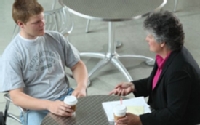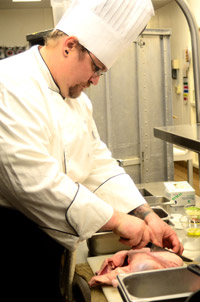Page 108 • (1,691 results in 0.023 seconds)
-
/Change Policy Labs & Studios Workshops Staff Contact Information Instructional Technologies Phone: 253-535-7525 Email: itech@plu.edu In-person support available at the Help Desk in Mortvedt Library Desk Hours Mon - Fri: 8am-5pm Related Links Help Desk LuteCast Streaming Media PLU Recordings Information & Technology Services PLU Knowledge Base Contact Information Instructional Technologies Phone: 253-535-7525 Email: itech@plu.edu In-person support available at the Help Desk in Mortvedt Library Desk
-
can attend every significant reform or cultural change. Luther’s oft-repeated question – “What does this mean?” – remains an appropriate and troubling question for any member of a university to entertain. Indeed, the capacity to question remains part of the genetic encoding of Lutheran higher education. Thus, the Lutheran reformers recognized centers of education – places in which important questions could be entertained without censure – as crucial in the formation of persons who could link
-
times for courses. (Note: days/times are approximate and subject to change)Course Schedule for Elementary CertificationSummer Semester (June – August): Classes and a practicum component. Students can expect to be in classes or at the practicum site all day Monday to Thursday with the occasional Friday or Saturday class. EDUC 510: Teaching Reading and Language Arts (3) EDUC 520: Issues of Child Abuse and Neglect (1) EDUC 544: Sociocultural Foundations of Education (2) EPSY 566: Advanced Cognition
-

subject to change, PLU has great relationships in the community and will find you a practicum site that fits your needs and interests. Right now, PLU’s MFT Department partners with six local community mental health agencies and an AAMFT Approved Supervisor at each site. 4. Diverse and supportive learning community:Students in the PLU MFT program come from a range of racial, ethnic and cultural backgrounds, various social class backgrounds, and a variety of religious and spiritual backgrounds. Students
-
use of synthetic chemical pesticides after World War II, Carson reluctantly changed her focus in order to warn the public about the long-term effects of misusing pesticides. In Silent Spring (1962) she challenged the practices of agricultural scientists and the government and called for a change in the way humankind viewed the natural world. Carson was attacked by the chemical industry and some in government as an alarmist, but courageously spoke out to remind us that we are a vulnerable part of
-
innovative approaches to work for social change. Featured speakers include Ben Atherton-Zeman, spokesperson for the National Organization for Men Against Sexism, and Lane and Patty Judson, parents of domestic violence victim Crystal Judson. Judson was fatally shot five years ago by her husband, then Tacoma Police Chief David Brame in a Gig Harbor parking lot. There will also be presentations by representatives from A Call to Men and Seattle-based The Men’s Network Against Domestic Violence, among others
-
April 3, 2008 SOAC Week highlights creativity, tradition The School of Arts and Communication Week kicked off with a showing of student Andrea Calcagno’s documentary about global climate change, and performances by saxophonist Jamie Rottle and vocalists Kari Liebert, Morgan Ostendorf and Maggie Smith. The annual event spanned a week in April and featured speakers, panels, workshops and performances. Under the theme “SOAC Week: Creative Community Building on Tradition,” the activities
-
. Carlos is awake and quick to help Lee make change for an imaginary $10 bill. But this is the first time he’s shown up for class in awhile. Lee never knows whether he’ll disrupt the entire class or be the star pupil. 8 a.m. – Cascade Middle School hallways Johnson is out and about, two-way radio in hand, roaming the hallways and courtyards of Cascade, keeping a watchful eye on his students. “I like to be visible in the hallway,” he says. “I haven’t been able to do enough of that this year.” He high
-

student clubs, and doing internships,” Brock said. “And we encourage students to get to know the faculty personally, so they can serve as guides, mentors and coaches.” In the case of Mattich, that meant being treated almost as though he was a colleague of professor Ptak – not just a first-year student. “What I like about this class is that the expectations were made very clear,” said Mattich. “Professor Ptak considered the course syllabus a contract with us. If she wanted to change anything, or we
-

required ingredient. This year, that ingredient is duck. Each chef has to prepare their duck in two classical cuts and, from there, what they do is up to them. Thinking resourcefully, chefs are to infuse their dish with local food available to them. This will change with the season and requires creativity and thought. These kinds of challenges are exactly what Blessum is looking for. “There’s so much you gain from it,” Blessum said. The judges will want to see improvisation and resourcefulness
Do you have any feedback for us? If so, feel free to use our Feedback Form.


